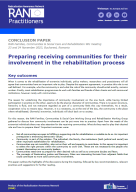Details
- Publication date
- 30 July 2024
- Author
- Directorate-General for Migration and Home Affairs
- Country
- Romania
- RAN Publications Topic
- Rehabilitation
Description
When it comes to the rehabilitation of extremist individuals, policy makers, researchers and practitioners will all agree that communities have an important role to play. Despite this apparent agreement, in practice this role is not well defined. For example, who the community is and what the role of the community should entail exactly, remains unclear. Finally, most rehabilitation programmes do work with families and friends of their clients and with communal institutions, however rarely with communities.
The reason for underlining the importance of community involvement on the one hand, while having limited participation in practice on the other, seems to be the elusive character of communities. There is no given structure, hierarchy is fluid, and not everyone regarded as part of a community feels this way themselves. As a result, cooperation is by no means easy. However, it is a necessity, as at the end of the day, the community is the place where rehabilitated, (formerly) extremist, individuals will dock back on to society.
For this reason, the RAN Families, Communities & Social Care Working Group and Rehabilitation Working Group gathered to discuss how community involvement can be put more into to practice. Apart from the needs of the extremist individuals there was also attention for the receiving communities. What do they need to play their desired role and how to prepare them? Important outcomes were:
- Not all communities are open to fulfilling a supporting role for rehabilitation or suitable to do so. An important prerequisite is embracing democratic values.
- Community is part of the solution. The individual, the family, the institutions (both judicial and social) are other important stakeholders for rehabilitation.
- Communities are not monolithic, also not on their will and capacity to contribute. In this sense it is important to select the right persons within the community to work with. These are not necessarily the people who present themselves as community leaders.
- Communities need time to prepare for their desired role as well as to overcome doubts and fears.
- The concepts of Restorative justice and Recovery Cities are interesting formats from adjacent fields that could contribute to more solid community involvement.
This paper outlines the highlights of the discussions during this meeting, followed by key recommendations, relevant practices and suggestions for further reading.

